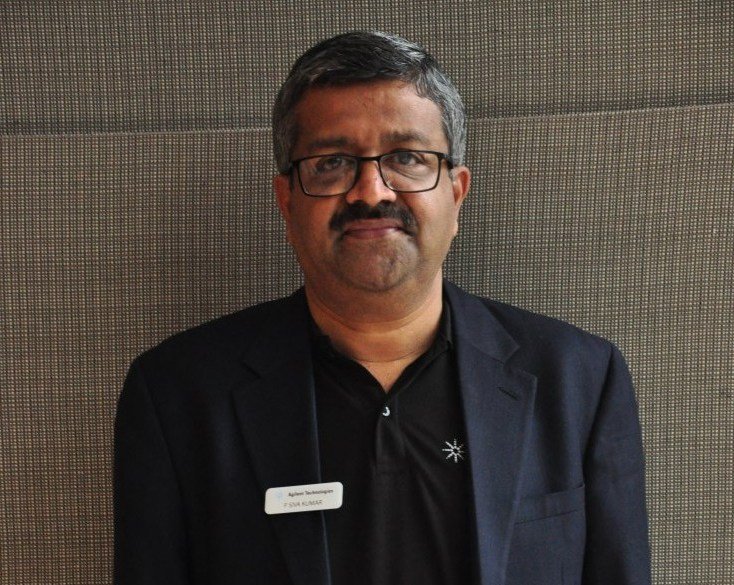Agilent growth on par with market
August 29, 2014 | Friday | Features | By BioSpectrum Bureau
Agilent growth on par with market
Mr Siva Kumar Pasupathy Country business head, Life Science & Chemical Analysis
Agilent Technologies, a global leader with a total portfolio of mass spectrometry techniques that meet various application needs of the industry, has been rolling out steps to bolster its presence in India. Over a period of time, the company has been registering an average 20 to 25 percent growth every year. However, according to BioSpectrum estimates, in FY 2013-14, Agilent India's lifesciences business stood at Rs 423 crore with a growth of over 15 percent. This can be considered better as compared to an estimated Rs 370 crore in FY-2012-13 when the growth was close to 2 percent, attributed to the slowing down of overall market and also the lack of funds in government and research institutes. The company sources also blame the prevailing macroeconomic conditions due to which customers across markets, especially in pharma, have been very cautious in purchase.
The pharma sector continues to be a large contributor to Agilent's Life Sciences and Chemical Analysis (LSCA) business. The Life Sciences Research Center in Bangalore, supports the company globally and develops methods across markets in lifesciences. The setting up of a lifescience application development lab, has helped it accelerate the discovery of analysis workflows.
About 60 percent of Agilent India's revenue comes from the LSCA group and 25 percent of the revenue comes from the lifesciences group in India. Overall, Agilent India contributes to 1 percent of the total revenue of Agilent. The company has a strong presence in the food and pharma markets, and in a similar manner would like to expand into other areas of the Indian market, such as environmental and material science. The recent acquisition of Dako, one-of-the-leading global suppliers of cancer diagnostics tools, providing antibodies, reagents, scientific instruments, and software to customers, has helped Agilent accelerate growth in several rapidly-expanding areas of diagnostics, as well as strengthen its existing offerings. Following that, Agilent formed a new business segment, the Diagnostics and the Genomics Group (DGG). The completion of the acquisition of Varian by the company has broadened its applications and solutions offerings in lifesciences. It also expanded Agilent's product portfolio into atomic and molecular spectroscopy; established a leading position in NMR, imaging and vacuum technologies; and strengthens its consumables portfolio.
Agilent has introduced many new products including the next generation Agilent 7100 Capillary Electrophoresis (CE) system, which has been claimed to provide at least 10 times more sensitivity than any other commercial CE instrument. Its industry-benchmarked 1200 series HPLC and 7890 GC have been its biggest revenue generators. Agilent's Rapid Resolution LC (RRLC), a fast LC, has been a big success in the pharma segment. It has also launched 6420 triple quadrupole liquid chromatography/ mass spectrometry LC/MS system, a replacement for the 6430 and 6460 systems. Besides that the company recently introduced 6550i Funnel quadrupole time-of-flight chromatography mass spectrometry (Q-TOF LC/MS) system.
Agilent has a big market share in pharma. It has also been growing significantly in food testing where it has done exceedingly well in the last two years. In parallel, it has also been reaching out to colleges and universities and focus is on direct channel so that there is quality. The company delivers 100-150 platforms every year. Its percentage of contribution to new clients has been growing.
The company has introduced the Microwave Plasma - Atomic Emission (MP-AES) for cost effective elemental analysis capabilities. The technology runs on air instead of argon gas cylinders required generally. It is much environmental friendly.
The operating of CrossLab inaugrated in November, 2013 at Agilent's Manesar facility is expected to further strengthen the company's CrossLab Enterprise Services, a synchronized laboratory solution by Agilent Technologies, a service model for all instruments regardless of the brand. CrossLab will deliver solutions that help improve results, reduce costs, and increase the productivity across the organization.
The company is into petro-chemicals, material sciences and agriculture, expecting to do well in these areas. Once the government mines are opened, it expects to do good business from mining too. It is looking at genomics, biosimilars, clinical diagnostics, clinical trials and food sectors as the huge potential areas for its future growth.









